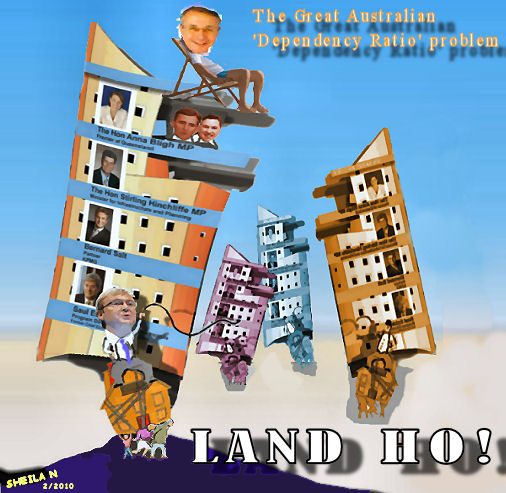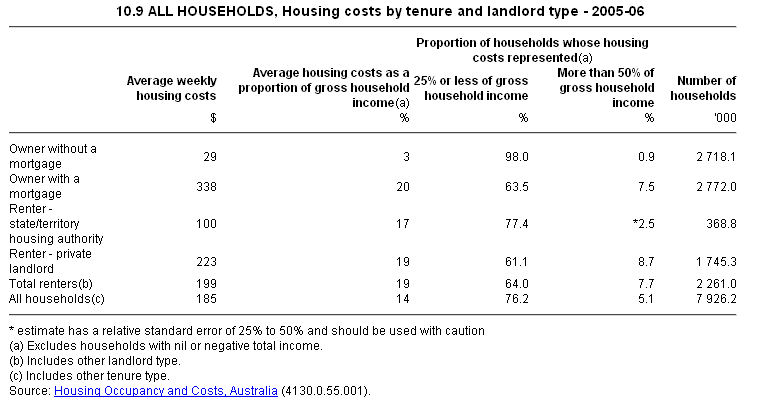
 Republished here to give background to Sheila Newman's remarks in her debate with Steve Bracks on the Jon Faine show 19-4-2010. You can comment on Jon Faine's "Population Forum" about the debate here and you can listen to the podcast here. The sector in Australia that has the most costly dependency ratio must be the property sector, since it costs all Australians an enormous and unreasonable amount just to cover the cost of land for housing, business and agriculture. Most of the very high costs involved are completely unnecessary, except in the eyes of greedy developers and their hangers-on
Republished here to give background to Sheila Newman's remarks in her debate with Steve Bracks on the Jon Faine show 19-4-2010. You can comment on Jon Faine's "Population Forum" about the debate here and you can listen to the podcast here. The sector in Australia that has the most costly dependency ratio must be the property sector, since it costs all Australians an enormous and unreasonable amount just to cover the cost of land for housing, business and agriculture. Most of the very high costs involved are completely unnecessary, except in the eyes of greedy developers and their hangers-on


Mr Salt, wrong again
Yesterday (4 Feb, 2010) the Australian had Bernard Salt raising the alarm about the dependency ratio (again). But the man is hopelessly misinformed. Elderly people are not the big problem. And children (who are more dependent and for longer and who outnumber elderly people) are not the problem either.
The sector in Australia that has the most costly dependency ratio must be the property sector, since it costs all Australians an enormous and unreasonable amount just to cover the cost of land for housing, business and agriculture. Most of the very high costs involved are completely unnecessary, except in the eyes of greedy developers and their hangers-on. The only reason that the costs are so high is that the industry wants it that way and our state and federal governments are in cahoots with it.
The housing industry is making life in Australia miserable
Australians pay these monstrous costs first and must deduct them from their disposable income. These unnecessary costs affect the amount of hours we must work and how hard we must work and whether we can afford to take holidays. They affect our health and happiness. The high prices affect the cost of doing business, of manufacturing, of storage, garaging etc. When these costs are inflated they take away from other economic and social obligations, which are to provide education, hospitals, child support and retirement funding in the form of pensions and superannuation. Yes, even for self-funded retirees, the cost of doing business is inflated by the cost of land and is deducted as a variety of costs from any profits which devolve to shareholders.

Australia's inflated land-costs
Australia's inflated land-costs mean that small business has had increasing difficulty surviving and that for an increasing number of Australians, survival itself - in terms of accessing shelter and having enough money left over for food and clothing - has become difficult and sometimes impossible. For more Australians each year, transport to get to work or education to train for employment, are luxuries. Yet all this could be changed if property development and housing were no longer considered as private profits but as public expenses and the factors that contribute to their inflation were adjusted accordingly. These factors are those which drive up demand. Demand is affected by births, deaths and immigration and, to a lesser extent, by household size, location and position, which may all be to some extent discretionary.
What drives the high cost of land in Australia?
The most noticeable adjustable drivers of demand are overseas and interstate immigration. Interstate immigration can be dealt with by adjusting building permits at local levels. Overseas immigration can be dealt with by State Governments ceasing advertising for new immigrants and by National Government revising immigration quotas downwards. For maximum reduction of costs, land and housing availability should be exactly equal to demand.
In a steady state society, houses would become available as people died, with some overlap, at very little cost.
It is Australia's housing industry which is responsible for elderly people being scapegoated instead of honoured and supported to enjoy the long and happy lives that we should all be able to look forward to.
ABS data
"For most Australians, whether buying or renting their home, the provision of adequate housing for themselves and their families involves substantial ongoing expenditure throughout much of their lives. Housing costs are often the largest regular expenses to be met from a household's current income.
The housing costs measure compiled from the Survey of Income and Housing is defined as the sum of:
* rent payments,
* rates payments (general and water), and
* mortgage or unsecured loan payments, if the initial purpose was primarily to buy, add or alter the dwelling."
Source: 1301.0 - Year Book Australia, 2008
It is always very difficult to get information from public sources on how the cost of land affects the cost of living in Australia because the Australian Bureau of Statistics refuses to treat land as a 'commodity' and our cost of living measure, the consumer price index, only factors in the cost of 'commodities' - other things you buy.
This kind of information is about the best we can get from the ABS (see below). It doesn't tell us very much. Most of the information is in the private sector and costs a lot to see.

It also doesn't tell us how much people who have businesses pay for rent and buildings on top of the money they pay for their own housing.
The ABS doesn't admit that land is like a commodity in Australia
Yet land is treated like a commodity in Australia, and we know for sure that for many of us it is our greatest burden:
“The development of stock mortgages and wool and crop liens in Australia represented legal ingenuity in that on traditional analysis, a property transfer was taking place with respect to something which would only come into existence in the future – the crop or wool to be grown.
In Australia land was not in itself a source of power but an asset capable of producing wealth. Improvements, particularly fencing, represented a high proportion of the value of real estate and borrowings on the land seem to have been greater than in England. It is thus argued that land in Australia was always viewed as a commodity, see Davidson and Wells, “The Land, the Law and The State: Colonial Australia 1788-1890” (1982) 2 Law in Context 89 AND Whalan, D., The Torrens System in Australia p.98.” Source: Adrian J Bradbrook, Susan V MacCallum, Anthony P Moore, Australian Property Law, LBC Information services, 1996, p.1.103:
Is the Property Development industry becoming an embarassment to its members?
Mr Salt recently argued that the property sector was being too timid. He implied that they had become somewhat embarrassed by bloggers highlighting the industry's reasons for promoting high immigration. He urged them to weigh into public debate and wondered why usually high profile growth lobbyists were acting like such wall-flowers.
"... I must say the “growth vs no growth” issue is ascendant and is likely to remain so during 2010. What disappointed me about this debate was the lack of supporting comment emanating from the property industry. No-one that I could see was out there putting the case for growth.
And I suspect the reason is that “big (property) business” doesn’t want to draw attention to itself on a contentious public issue. There seems to me to be almost a timidity in property individuals getting involved in public debate about growth. The logic seems to be don’t rock the boat."
Who would want to admit they are in this industry?
Well, maybe, the property industry is becoming a little more self-aware and less inclined to shoot from the mouth. Perhaps some of the younger people in the industry are becoming ashamed of the role the industry plays in creating and increasing poverty and inequality. Perhaps some of the young planners and builders aren't too keen on trashing the countryside. Maybe when young property developers, engineers, planners and developers you go to parties these days, their mouths go dry and they blush when some nice girl or bloke asks them what they do for a living.
I mean, what do you say? "I make my money out of unaffordable housing." "My boss is a land-speculator." "I serve the land-lords of the world." "We're in the business of overpopulation. It's good for our profits." "Oh, your mother protested on the steps of parliament last week?" "You hate people who bulldoze trees?" "Um, you think we cause most of the carbon gas increases in Australia?" "Well, I didn't choose to have small animals flee at my approach." "Gee, I might be responsible for people dying of thirst in a few decades, and I'm already responsible for animals dying of starvation, but hey, it's a job."
"The only way to offset the impact of the baby bust next decade is to grow the tax base through immigration. That’s why we need a big Australia, at least in the short term. And, make no mistake, this trajectory is good news for the property industry," writes Bernard Salt.
Well, no, Bernard. There is another way and it involves downsizing the property development industry so that we can afford what any normal functioning society can expect to provide for its children and elderly.
I look forward to some intelligent and responsible leadership from those young people who are currently embarrassed by their industry.
Anticipating the counter-argument
Basic economics requires profit to be made from land so that society can have publicly available infrastructure. Land commodifiers and speculators use the need for a profit margin to justify the buying and selling of land at unreasonable prices and for government and business conspiring to inflate those prices. But, when the costs of land are so high that they make business impossible, the time has come to say good-bye to the private housing and development industries.
NOTES
First published here 2/6/2010 but republished to give background to my remarks on Jon Faine Show - 19-4-2010

Comments
James Sinnamon
Sat, 2010-02-06 18:37
Permalink
Should those who created the mess, be trusted to fix it?
Milly (not verified)
Sat, 2010-02-06 19:20
Permalink
Housing crisis due to immigration
Jill (not verified)
Mon, 2010-02-08 10:00
Permalink
Housing prices
James Sinnamon
Mon, 2010-02-08 22:34
Permalink
Yet another Brisbane retail business threatened by rent gouging
quark
Fri, 2010-03-12 10:50
Permalink
Salt at it again
Anonymous (not verified)
Mon, 2010-04-19 15:34
Permalink
A Salty.
Anonymous (not verified)
Tue, 2010-04-20 17:00
Permalink
No growth can do on forever
John Marlowe
Tue, 2010-04-20 23:31
Permalink
Growth addiction undermines social health
"No growth can be limitless"? Well perhaps in the minds of those driving it and benefitting from it.
But what does the property aristocracy care for the plight of renting serfs? So long as the rent is paid and their property prices keep rising, personal wealth is all that matters. Rudd and Swan are simpletons convinced we live in an economy, but we live in a complex society.
But few politicians are educated in sociology. Most politicians living gated lives with insulated salaries, looking through their rose coloured glasses consider people just economic 'resources'. Economic statistics drive an unquestionned, almost evangelistic movement of 'ECONOMIC GROWTH'.
Australian society is being told that only the economy really matters and they believe it as if it were a deity. And so economic growth is encouraged to drive exploitation, personal wealth imbalance, while social issues are ignored. Liberal and Labor are factions of the 20th Century simplistic free market ideology. They do not care who is NOT benefitting from economic growth, nor the downsides, nor the social inequities and social costs. We do not have Quality GDP, just GDP. Rudd and Swan live by the KISS principle. They seek to reduce complexity to simplicity because it is easier to understand and manage. It is blissful ignorance.
Society is not harnessing growth. Instead, Liberal and Labor philosophy is to just let economic growth run a muck presuming all good will flow from it to all corners of society, which is deluded simpleton fantasy. The only blunt control used is for the Reserve Bank to raise interest rates. Mortgage holders are financially punished for the excesses of consumer spending and corporate marketing.
What should be GROWING is the quality of life of underprivileged Australians - of whom there are many.
The addition to growth is undermining our society. Growthism fuels urban sprawl, congestion, rising costs of living, housing unaffordability and social stress manifesting as longer work hours, reduced leisure, recued exercise, family breakdown, substance abuse, homelessness, crime, mental health problems and suicide.
Alongside quarterly GDP, I would like to see posted by local government area Suicide Rates, Cost of Living Index and Homelessness as indicators of social health around the country.
Here's a good read: Why Economic Growth may not bring increased Happiness
Vivienne (not verified)
Wed, 2010-04-21 08:13
Permalink
People are not just stackable economic units
John Marlowe
Wed, 2010-04-21 16:31
Permalink
Sydney's 'Metropolitan Strategy' for another 1.1 million
In 2004, the NSW Government prepared its
Metropolitan Strategy as a "broad framework to secure Sydney's place in the global economy by promoting and managing growth...over the next 25 years."
It is a reaction to mass federal immigration encouraged by the Howard Liberal Government and accelerated by the Rudd Labor Government - same ideology different faction.
The Metropolitan Strategy states:
* 640,000 new homes;
* 500,000 more jobs are being planned for over the next 25 to 30 years
* 7,500 hectares of extra industrial land if current trends continue
* 6.8 million square metres of additional commercial floor space; and
* 3.7 million square metres of additional retail space.
Even if we have zero population growth over that time, i.e. our births and migration equal deaths, we would still require 190,000 new homes in Sydney to respond to demographic changes where fewer people are living in each home.'
It idenifies the TRENDS AND DRIVERS as follows:
* population growth and demographic change, including migration trends, birth rates, and ageing population and less people living in each household;
* employment growth and change, including more service and office based jobs and a shift to integrated office, production and warehousing operations which means more land is required for some economic activities;
* the increasing globalisation of the economy, which means Sydney and Australia have to compete internationally to attract investment and sell goods and services overseas to remain prosperous;
* the push for more sustainable development, in the face of global environmental and climatic changes, which creates drier and more unpredictable weather events, and increased rates of consumption of natural resources such as water and fuels for energy;
* the rising costs of transport-fuel prices, congestion, greenhouse gas emission, air quality and community physical and mental health - are placing in! creasing burdens on families and business.
* Demand for travel is increasing faster than population growth and the largest increase is in the use of private vehicles.'
Love that phrase 'sustainable development'. Sustainable for whom?
Whereas, “a Coalition state government would allow more Greenfield developments on Sydney’s fringes.” [SMH 12th March 2010, p.4]
It's just like the 1960s all over again and a 1960s Lib/Lab response.
CSI (not verified)
Thu, 2010-04-22 07:40
Permalink
This will end very badly
Sheila Newman
Thu, 2010-04-22 10:46
Permalink
Mark O'Connor debates Population with Marcus Spiller tonight
Vivienne (not verified)
Fri, 2010-04-23 08:38
Permalink
Concern about increased investment in rural property
John Marlowe
Sun, 2010-04-25 10:55
Permalink
Rudd: Australia's first Chinese Prime Minister
Milly (not verified)
Mon, 2010-04-26 16:59
Permalink
Foreign investment in Australian property
Simon (not verified)
Thu, 2010-04-29 16:43
Permalink
Jon Faine's Population Forum now fixed
Sheila Newman
Mon, 2019-03-25 13:33
Permalink
Steve Bracks/Sheila Newman/Jon Faine population forum -removed
Gomez (not verified)
Thu, 2014-07-10 21:26
Permalink
Friends in Australia tell of high cost of living
Sheila Newman
Wed, 2017-02-22 23:05
Permalink
Does work have a future? Brave new workplace - video
Why are so many people - globally - so disengaged with their job? We’re all working harder and longer yet many people are doing work they feel is meaningless. So we ask what wrong with employment? In the video linked to below, Host Ross Ashcroft is joined by writer and commentator Elaine Glaser and author of Bullsh*t Jobs and anthropologist David Graeber. It's quite a good review of the subject lasting about 20 minutes.
https://www.rt.com/shows/renegade-inc/377925-global-employment-people-disengaged/
Add comment